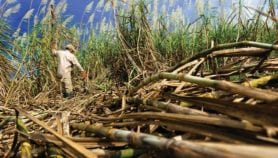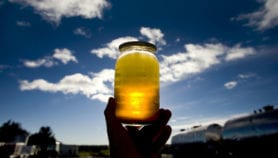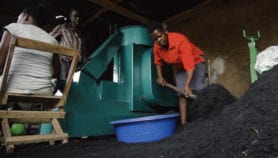By: T.V. Padma
Send to a friend
The details you provide on this page will not be used to send unsolicited email, and will not be sold to a 3rd party. See privacy policy.
[NEW DELHI] India has approved a national biofuel policy that aims to raise the proportion of biofuels from five to 20 per cent in petrol and diesel fuels over the coming decade, using non-edible plant sources.
The Indian government approved the policy last week (11 September). The policy states that by 2017, transport fuels in India need to contain 20 per cent biofuel.
Two main types of biofuels are envisaged: alcohol from plant wastes, chiefly sugarcane molasses, and biodiesel — oil produced from non-edible oilseed crops such as jatropha curcas, which can be blended with diesel.
The policy supports increasing biodiesel plantations on community, government-owned and forest wastelands, but not on fertile, irrigated lands. The government estimates 13.4 million hectares of barren land are available for jatropha cultivation, which could potentially yield 15 million tonnes of oil each year.
The policy also details incentives for growers of biofuel crops: removing taxes and duties on biodiesel, setting a minimum ‘support’ price for buying biodiesel oilseeds from growers and a minimum purchase price of bio-ethanol from oil marketing companies. These should ensure adequate returns to both crop growers and oil makers.
India imports over 70 per cent of its petroleum and the Indian Planning Commission estimates that, by 2017, the country’s demand for petrol will rise to 16.40 million tonnes.
But biofuels will only substitute a little for fossil fuel use, yet lock huge land areas for crop cultivation, says Anumita Roychowdhury, associate director for research and advocacy at the Centre for Science and Environment, a Delhi-based nongovernmental organisation.
Instead of giving subsidies for biofuel production, the Indian government should invest in policies that reduce overall demand for fuels, such as encouraging use of public transport and restraining use of personal vehicles, Roychowdhury told SciDev.Net.
The Indian Express reported (16 September) on the experiences of Chhattisgarh state, where 400 million Jatropha saplings were planted on more than 155,000 hectares of fallow land in the last three years. However, until now, there has been no reported data on survival of saplings or seed production.
Farmers in many areas are in a fix as the trees have not yet borne fruits, while in places where they have, various departments and local agencies, are waiting for guidelines on collection and sale of seeds.
A 2006 analysis by the UN Conference on Trade and Development (UNCTAD) concluded that India cannot rely on sugarcane molasses as a reliable feedstock for alcohol, given the crop’s dependence on monsoon and vagaries of the domestic sugar industry. Similarly, difficulties in procuring oilseeds and lack of infrastructure could obstruct substantial biodiesel production by 2011–12.
UNCTAD suggested that India might have to import both bio-ethanol and biodiesel to meet its targets.













